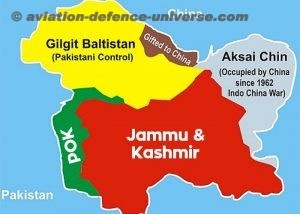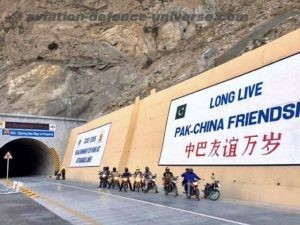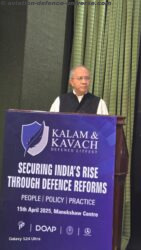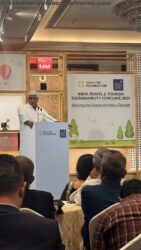· India Lodges Complaint
By JK Verma

New Delhi. 01 June 2018. Ministry of External Affairs summoned Syed Haider Shah, Deputy High Commissioner of Pakistan High Commission in New Delhi recently and lodged a strong protest on passing of “Gilgit- Baltistan Order” of May 21, 2018. Under the order, Prime Minister of Pakistan has snatched powers from Gilgit Baltistan (GB) council to handle the affairs of GB. The MEA made it clear that entire state of Jammu & Kashmir including GB became integral part of India after the Instrument of Accession in 1947 and Pakistan has no right to change the prevailing status quo and it should handover the illegally occupied areas of J&K to India. Gilgit Baltistan order is an attempt by Pakistan to convert GB into its fifth province.
Analysts claim that Pakistan government passed Gilgit-Baltistan Order-2018 under pressure from Beijing as China Pakistan Economic Corridor (CPEC) passes through GB and China promised to invest more than $50 billion in CPEC. Hence China pressed that Pakistan must clarify the status of GB as China will not invest such a huge amount in a disputed area. China has not made any direct comment on the Order and Chinese spokesperson mentioned that CPEC is only for economic purposes and Chinese stand remains unchanged and Kashmir issue has to be resolved by India and Pakistan. China wants that India should join President Xi Jinping dream project The Belt and Road Initiative (BRI) hence it emphasised that CPEC which is a part of BRI is an economic project and has nothing to do with Kashmir issue and it will be decided by India and Pakistan. The CPEC links the restive region of Xinjiang of Western China to Gwadar port in Pakistan.
India has not only refused to join CPEC but also raised objections as it passes through the areas of J&K which is legally part of India but illegitimately occupied by Pakistan. The area of Kashmir illegally occupied by Pakistan was divided into two parts Pakistan occupied Kashmir (POK) and Gilgit & Baltistan.
Pakistan also summoned India’s Deputy High Commissioner in Islamabad on May 28 and issued a demarche on Indian claim that whole of J&K belongs to India. Pakistan State Office issued a statement mentioning that Pakistan categorically rejects “Indian statement on the Gilgit Baltistan Order 2018” as it is “baseless and fallacious”. The statement claims that J&K is a disputed territory.
The people of GB also protested against passing of illegal Gilgit-Baltistan Order. The protesters which belonged to all political parties came out on the streets, shouted anti-government and anti-Pakistan slogans. The protesters were carrying banners and placards and were protesting against the order. They also clashed with security personnel and police had to use teargas shells, resorted to lathi-charge and at last on firing in which several protesters were injured.

The residents of Gilgit and Baltistan especially students also hold a demonstration outside National Press Club in Islamabad against the order under the aegis of Gilgit-Baltistan Council of the Quaid-e-Azam University. The protesters claimed it as an “illegal occupation of the local people’s land”. The demonstrators shouted slogans against federal as well as provincial governments and claimed that the enactment is a ‘black law’ and asserted that the law will not only grab the powers of provincial government but will make it a rubber-stamp which will only obey the wishes of Central government.
India objected Pakistan’s illegitimate efforts of declaring GB as its fifth province as it is part of J&K which is an integral part of India. Delhi also criticised Pakistan for human right violations, building dams and even conducting elections in GB.
India also conveyed its displeasure to China about construction activities in GB which is part of India but illegally occupied by Pakistan. In fact India is objecting it since 1960 but this time India made it part of its bilateral relations with China.
Pakistan intends to declare GB as its fifth province partially under pressure from China and partly to utilise the untapped resources of GB which contains water & minerals.
Pakistan’s Kashmir centric pomposity overshadowed GB but it does not minimize its importance. GB is much bigger than POK and Indus River first passes from GB before entering Pakistan. Important glaciers including Siachen Glacier from where several rivers come out is also part of GB. Pakistan’s dependence on GB will enhance due to climate change and need of arable land because of population explosion. The average population growth rate of Pakistan is 2.40 % which is highest in the region. China has agreed to construct two big dams on Indus River at Bunji and Diamer-Bhasha which will produce electricity and can be utilised for irrigation purposes.
GB is very important strategically; in fact without control over GB it will be difficult to defend POK and control over GB and POK helps in defending Pakistan. GB is located at the crossroads of Indian subcontinent, Central Asia and China. In fact Pakistan gets land access to China through Karakoram Highway which passes from GB. GB is also close to Afghanistan and it shares borders with Kashmir valley, Xianjiang and Tibet.
Punjabi dominated Pakistan neglected GB and although it was under the Ministry of Kashmir Affairs and Gilgit Baltistan but because of ethnic and emotional differences no progress was made in GB. POK is governed by a constitution while GB is governed through ad-hoc laws. The demand of restoration of the state subject rule of residents of GB was also not fulfilled. There is also difference in oath of office. In POK oath, it is stated that to ‘ remain loyal to country and cause of accession of the state of J&K to Pakistan while in GB the oath simply mentions to be loyal to Pakistan which indicates that POK is yet to merge while GB is already merged with Pakistan. The per capita income of GB is one-third of a Pakistani per capita income which indicates the poor condition of the GB which has to fulfill all the liabilities and duties of a province but no right is given to the residents of GB.
Islamabad sent a very big delegation to China to attend Belt and Road Forum but Chief Minister of GB was not included. The details of CPEC are still not revealed and the residents of GB feel that CPEC will be beneficial only to Punjab and will be harmful for Balochistan and GB. The inhabitants of GB want to know about the transit fees and compensation they will receive as so many infrastructure projects would be constructed on their land. They also suspect that workers of other states especially from Punjab will come in GB on the name of construction of these infrastructure projects and will settle in their areas which may change the demography of the region.
People of Gilgit speak Dardic language and residents of Baltistan speak Balti while Urdu is national language of Pakistan and Punjabi is the most important language. Majority population of GB are Shia Muslims while there are diverse Sunni terrorist outfits which slaughters Shias and have protection from sinister Inter Services Intelligence. The gulf between Shias and Sunnis has enhanced all over the world and Pakistan which has about 20 percent Shia population is no exception. Saudi Arabia helps Wahhabi organisations and few of them are anti-Shias. Not only this Islamic State (IS), the most powerful terrorist outfit adheres to Salafi ideology and it does not consider Shias as true Muslims and pledge to exterminate them.
China is also taking interest in GB because of diverse reasons. CPEC connects the restive province of Xinjiang with Pakistan and Afghanistan. The Uighur Muslims in Xinjiang province have constituted few terrorist outfits and fighting for a separate country. Few Muslim terrorist organisations in Pakistan and Afghanistan are assisting the Uighur terrorists hence China wants strong military presence in GB to curb any rebellion. China is also interested to exploit hydro-electric power resources and mineral resources of GB.
Pakistan wants to exercise more control over GB which is not only a disputed territory but the population of the area which is Shia is also against Pakistan as Punjabi rulers are exploiting the resources of the area and not allowing any development of the region. As Punjabi rulers could not manage the area, now they want to take Chinese help in controlling the area. Pakistan does not realise that China has expansionist policies and they have interest in the minerals, water resources and arable land of GB and if once they will occupy, they will not return the areas to Pakistan.
Pakistan just to harm India is allowing China to establish itself in GB which will be harmful in long run. Pakistan erroneously feels that China will assist it in getting the occupation of Jammu & Kashmir and that is the fundamental reason it is giving concessions to China.
The analysts mention that it is a clever move of present government as it satisfied China and also it will appease Kashmir lobby in the country and it will benefit the party in forthcoming elections which is just few months away. However it also points out Pakistan’s excessive dependence on China which is not good for a sovereign nation.
(Jai Kumar Verma is a Delhi-based strategic analyst and a retired senior intelligence officer. He is also member of United Services Institute of India and Institute for Defence Studies and Analyses. The views in the article are solely the author’s. He can be contacted at editor.adu@gmail.com)





























































































































